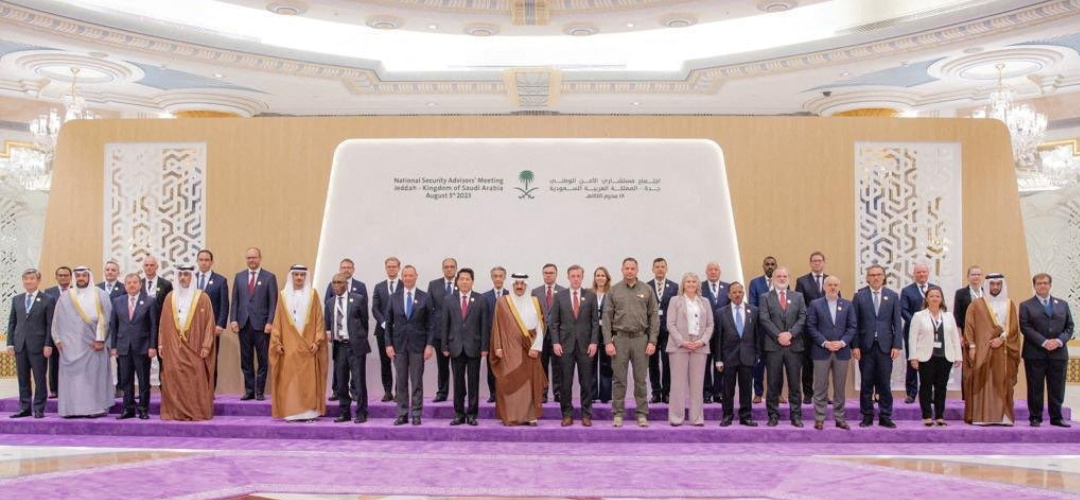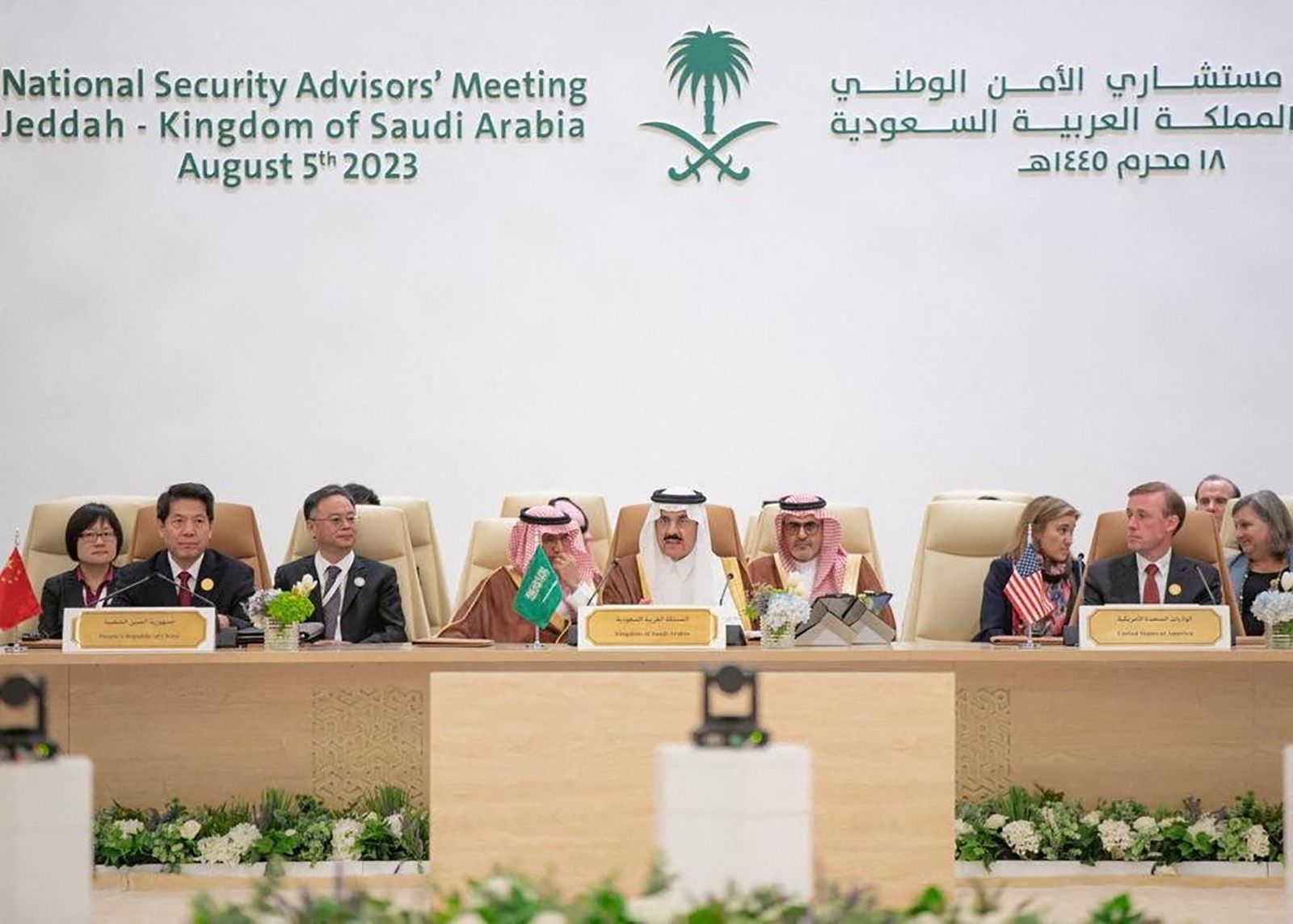Jeddah Talks: Chinese Chequers?
August 12, 2023 | Expert Insights

Just as the lukewarm Russia-Africa Summit ended (with fewer than 20 of Africa's 54 heads of state or government attending) with little success in getting a grain deal or charting a road to peace in Ukraine, another initiative was taking place amidst the blazing sands of Jeddah.
The two-day Jeddah Summit, attended by 40 countries, including China, India, the United States, and European countries, but not Russia, was the second of its kind after a somewhat similar meeting held in Copenhagen earlier this year. The aim was to arrive at some key principles acceptable to both warring sides involved in a mutual bloodletting in Ukraine. Of course, since President Zelensky refuses to budge from his 10-point peace plan, little progress was made.
However, the interesting part was China’s last-minute decision to attend the Saudi-hosted Ukraine peace talks. China had previously declined to join at Copenhagen, not happy that a NATO member was hosting it. But its attendance in Jeddah signalled a willingness to engage more actively in efforts to end the war. During the talks, China supported a third round of talks to find a framework for peace in Ukraine.
Background
Of course, spirits rose when China announced its intention to join the Jeddah summit. Known to be the only supporter of note that the Kremlin possesses today, it was widely felt that Chinese influence could lead to loosening the log jam. China has been steadfast in supporting its long-time ally Russia and has stopped short of criticising Russia for the invasion, like India, despite the economic price of such a decision and sharpening of the divisions with an already hostile West. But always the pragmatist, Beijing realises the economic impact of the war on its global trade cannot be ignored indefinitely and has been increasingly playing a more active role in its resolution. Sadly, no major breakthrough was achieved at Jeddah. However it appears that all participants reached an understanding to keep the lines of communication open between the two sides and persist with the peace efforts.
Towards this end, President Xi Jinping’s statement on the eve of the Jeddah talks is significant when he promised China’s commitment to "work with all parties to promote a political solution to the Ukraine crisis" while maintaining “an objective and impartial position." on the conflict. In a statement after the talks, President Xi said that the talks had been "constructive" and that they had "helped to clarify the positions of the parties involved". He also said China would "continue to play a constructive role in promoting a political solution to the Ukraine crisis".

Analysis
The Jeddah talks were different from the earlier rounds of talks in that the West did not organise them. This meant that China would not be seen as aligned with the West against Russia. Instead, China could play a more neutral role in the talks. Additionally, the Jeddah talks were attended by a wider range of countries than the earlier rounds of talks. This included traditionally neutral countries on the Ukraine issue, such as Saudi Arabia, Egypt, India, Brazil, and Mexico. This could help to build support for a peaceful resolution among a wider range of countries.
The implications of China's participation in the Jeddah talks are still unfolding. However, it is clear that China's willingness to engage in these talks is a sign that it is concerned about the negative impact of the Ukraine war on its own interests. The war has disrupted global energy and food markets and raised tensions between Russia and the West. China is likely hoping that participating in the peace talks can help reduce these tensions and mitigate the negative impact of the war on its own economy.
China's participation could also have a broader impact on the global order. China may be trying to play a more active role in global affairs. China has traditionally been a more cautious actor on the world stage, but it has been increasingly assertive in recent years, going by its success in bringing about a rapprochement between Riyadh and Teheran. It is a sign that China is willing to take on a more active role in resolving international conflicts.
The war in Ukraine has strained relations between China and the West. If China can bring to bear its immense influence on both parties, it would do much for Beijing's prestige and also bring down a notch the rising tensions with the West. With the much-touted Ukrainian summer offensive making little headway and images of burning Leopard tanks and Bradley IFVs making poor press for NATO, the U.S. and its allies are at a loss for how to bring this war to an end. Obviously, a military solution is not the answer. Maybe the route to peace lies through Beijing. China's significant economic leverage could help convince Mr Putin, even if it involves a little bit of loss of face, that peace benefits the Kremlin as much as it does Kyiv. On the other hand, the West has to convince Kyiv that the massive reconstruction of Ukraine will only get the financial backing if Mr Zelensky rejigs his rigid 10-point peace plan, including accepting some loss of territory.
Assessment
- It is still too early to predict the ultimate implications of China's participation in the Jeddah talks. However, it is clear that China is seeking to play a more active and objective role in Ukraine's peace process, which is an encouraging sign. As the important global players, including China, meet again soon, there are hopes that some positive movement could occur by the year's end. Both sides are waiting to see how the battlefield gains and losses turn out once the Ukrainian counter-offensive runs out of steam.
- This could have a significant impact on the conflict, and it could also have a broader impact on the global order. Not to be lost sight is the role that Riyadh is playing in this initiative. There is a lot at stake for Saudi Arabia, which touched a raw nerve in Washington when it surprised everyone with its peace deal with Iran under the aegis of Beijing. A peace deal in Ukraine would go far in restoring its relations with the U.S. and its EU partners.
- China has been a close ally of Russia for many years and has been reluctant to criticise Russia's invasion of Ukraine. However, the war has hurt China's economy and raised tensions between China and the West. It is time China played a little hardball with its friends in the Kremlin.








Comments